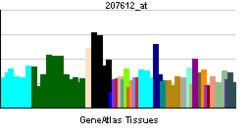WNT8B
| Wingless-type MMTV integration site family, member 8B | |||||||||||||
|---|---|---|---|---|---|---|---|---|---|---|---|---|---|
| Identifiers | |||||||||||||
| Symbol | WNT8B | ||||||||||||
| External IDs | OMIM: 601396 MGI: 109485 HomoloGene: 2550 GeneCards: WNT8B Gene | ||||||||||||
| |||||||||||||
| RNA expression pattern | |||||||||||||
 | |||||||||||||
| More reference expression data | |||||||||||||
| Orthologs | |||||||||||||
| Species | Human | Mouse | |||||||||||
| Entrez | 7479 | 22423 | |||||||||||
| Ensembl | ENSG00000075290 | ENSMUSG00000036961 | |||||||||||
| UniProt | Q93098 | Q3TER4 | |||||||||||
| RefSeq (mRNA) | NM_003393 | NM_011720 | |||||||||||
| RefSeq (protein) | NP_003384 | NP_035850 | |||||||||||
| Location (UCSC) | Chr 10: 102.22 – 102.24 Mb | Chr 19: 44.49 – 44.51 Mb | |||||||||||
| PubMed search | |||||||||||||
Protein Wnt-8b is a protein that in humans is encoded by the WNT8B gene.[1][2]
The WNT gene family consists of structurally related genes that encode secreted signaling proteins. These proteins have been implicated in oncogenesis and in several developmental processes, including regulation of cell fate and patterning during embryogenesis. This gene is a member of the WNT gene family. It encodes a protein showing 95%, 86%, and 71% amino acid identity to the mouse, zebrafish and Xenopus Wnt8B proteins, respectively. The expression patterns of the human and mouse genes appear identical and are restricted to the developing brain. The chromosomal location of this gene to 10q24 suggests it as a candidate gene for partial epilepsy.[2]
References
- ↑ Lako M, Strachan T, Curtis AR, Lindsay S (Sep 1996). "Isolation and characterization of WNT8B, a novel human Wnt gene that maps to 10q24". Genomics 35 (2): 386–8. doi:10.1006/geno.1996.0374. PMID 8661156.
- ↑ 2.0 2.1 "Entrez Gene: WNT8B wingless-type MMTV integration site family, member 8B".
Further reading
- Katoh M, Katoh M (2007). "Conserved POU/OCT- and GATA-binding sites in 5'-flanking promoter region of mammalian WNT8B orthologs.". Int. J. Oncol. 30 (5): 1273–7. doi:10.3892/ijo.30.5.1273. PMID 17390031.
- Deloukas P, Earthrowl ME, Grafham DV et al. (2004). "The DNA sequence and comparative analysis of human chromosome 10.". Nature 429 (6990): 375–81. doi:10.1038/nature02462. PMID 15164054.
- Brandenberger R, Wei H, Zhang S et al. (2005). "Transcriptome characterization elucidates signaling networks that control human ES cell growth and differentiation.". Nat. Biotechnol. 22 (6): 707–16. doi:10.1038/nbt971. PMID 15146197.
- Saitoh T, Mine T, Katoh M (2002). "Expression and regulation of WNT8A and WNT8B mRNAs in human tumor cell lines: up-regulation of WNT8B mRNA by beta-estradiol in MCF-7 cells, and down-regulation of WNT8A and WNT8B mRNAs by retinoic acid in NT2 cells.". Int. J. Oncol. 20 (5): 999–1003. doi:10.3892/ijo.20.5.999. PMID 11956596.
- Saitoh T, Mine T, Katoh M (2002). "Up-regulation of WNT8B mRNA in human gastric cancer.". Int. J. Oncol. 20 (2): 343–8. doi:10.3892/ijo.20.2.343. PMID 11788899.
- Lako M, Lindsay S, Bullen P et al. (1998). "A novel mammalian wnt gene, WNT8B, shows brain-restricted expression in early development, with sharply delimited expression boundaries in the developing forebrain.". Hum. Mol. Genet. 7 (5): 813–22. doi:10.1093/hmg/7.5.813. PMID 9536085.
- Smolich BD, McMahon JA, McMahon AP, Papkoff J (1994). "Wnt family proteins are secreted and associated with the cell surface.". Mol. Biol. Cell 4 (12): 1267–75. doi:10.1051/jp3:1994201. PMC 275763. PMID 8167409.